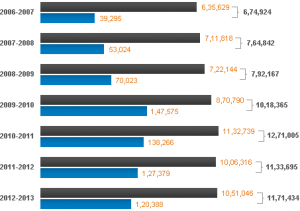Premier Pauline Marois from Parti Québécois government is pledging $2-billion for a new job creation plan, as an attempt to reboot the province’s economy by creating more than 40,000 new jobs by 2017. At first glance, that number may seem a little crazy, and maybe even sound like an election campaign.
The plan is to encourage new investments and jobs in Quebec through incentives such as electricity at discounted rates and tax credits. The money will be used to fund employment and also go towards developing Quebec in aspects such as its infrastructure, as well as for the development of an electric transit industry in Quebec that will build electric cars, railways, and related infrastructure. Also, more than $700-million will be put in tax credits as well as discounted hydro rates for companies which invest to create new jobs.
Marois claims that her government expects to see a total of 115,000 new jobs created by 2017. When she was challenged with the suggestion that her government was taking this initiative as a step towards planning for an election, she simply denied the accusation stating that the plan has been under consideration for the last 4 months.
Opinions on this plan, as expected, differ substantially. For instance, Yves-Thomas Dorval, president of Quebec’s largest employers group, the Conseil du patronat, believes that the plan will not be successful to a large or even considerable extent. “There’s no big change here. They are good measures, but not really what we need to bring Quebec to the level we would like,” he said.
Furthermore, the opposition in the national assembly are also questioned the logic of the new plan, saying that it seems that an election is near. François Legault, leader of the Coalition Avenir Québec said “There’s a lot more than the price of electricity that a company has to consider before it invests,”
When governments propose such large plans, it is only natural that opinions from all sides will differ substantially. What are the true motives behind this plan? Are they are based on good intentions and this is indeed a plan for success, or it is just some more election propaganda? We’ll find out soon!
“PQ Announces $2-billion Jobs Plan.” CBCnews. CBC/Radio Canada, 7 Oct. 2013. Web. 07 Oct. 2013. <http://www.cbc.ca/news/canada/montreal/pq-announces-2-billion-jobs-plan-1.1928834>.


